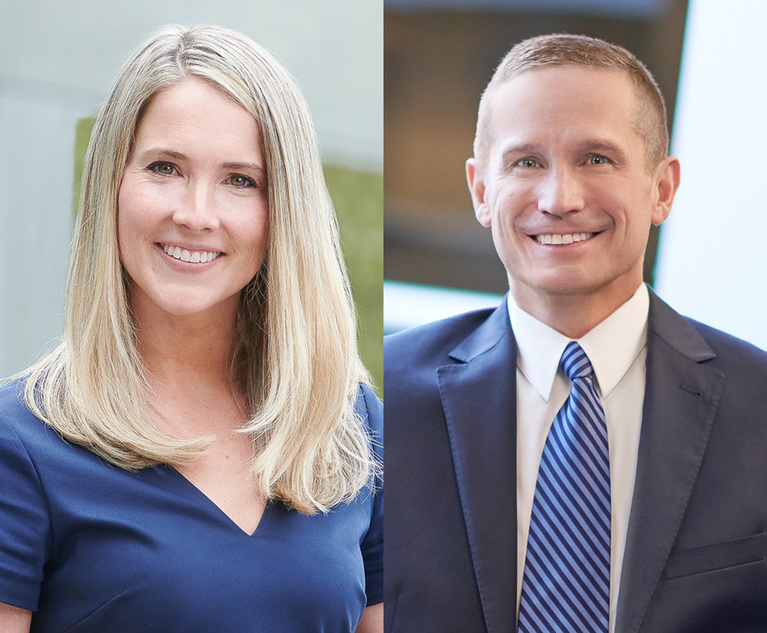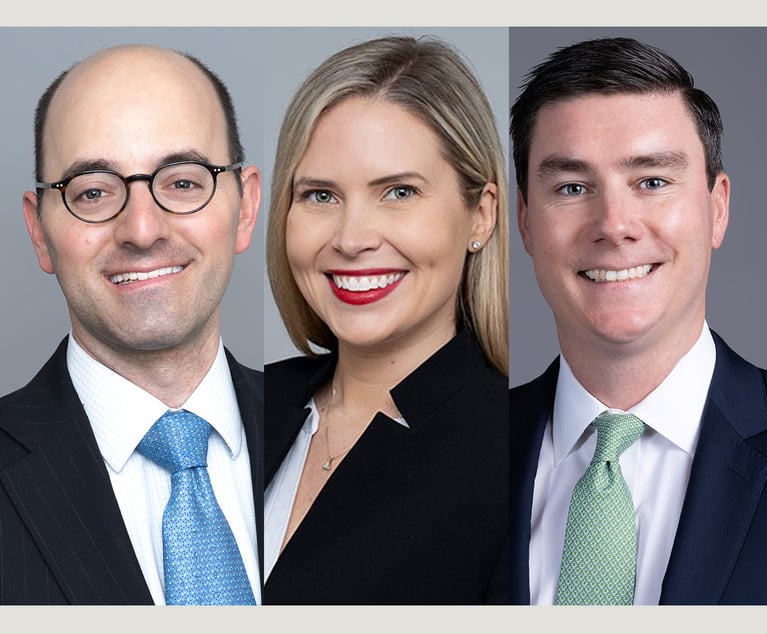Practical Issues in the Portability of the Deceased Spousal Unused Exclusion Amount
At death, an individual who made no taxable gifts during life will have the entire basic exclusion amount remaining. An individual who made taxable gifts during life will have something less than the full basic exclusion amount remaining since a portion would have been applied to those lifetime gifts. In either event, the remaining basic exclusion amount, full or partial, will be available to apply against taxable transfers occurring at the individual's death.
May 19, 2023 at 12:52 PM
9 minute read
 Megan E. Cannella,left, and Frederick K. Schoenbrodt, II,right, of Bressler, Amery & Ross. Courtesy photos
Megan E. Cannella,left, and Frederick K. Schoenbrodt, II,right, of Bressler, Amery & Ross. Courtesy photos
What Is Portability?
"Portability" is the term used to describe a surviving spouse's use of the unused estate tax exclusion amount of a deceased spouse. Through application of the unified credit for estate and gift tax purposes to gratuitous transfers of wealth during life or at death, every U.S. citizen and domiciliary may exclude from federal estate and gift taxation an aggregate amount of the value of those transfers. That amount, known as the basic exclusion amount, is currently at a historic high of $12,920,000 per person. See Treas. Reg. Section 20.2010-1(e) (2019). At death, an individual who made no taxable gifts during life will have the entire basic exclusion amount remaining. An individual who made taxable gifts during life will have something less than the full basic exclusion amount remaining since a portion would have been applied to those lifetime gifts. In either event, the remaining basic exclusion amount, full or partial, will be available to apply against taxable transfers occurring at the individual's death.
Taxable transfers at death usually are transfers to beneficiaries other than the surviving spouse or charity, since the estate tax law generally allows for the unlimited deduction from the gross estate of amounts passing to a spouse or charity. When a decedent is survived by a spouse, the decedent's unused exclusion amount may be transferred to the surviving spouse and added to the survivor's own exclusion amount. The amount of the deceased spouse's unused basic exclusion is known as the deceased spousal unused exclusion amount, or "DSUE amount" under the applicable Treasury regulations. The transferability of the DSUE amount to a surviving spouse is known as portability.
Prior to the federal tax law's adoption of portability in 2010, each spouse's federal estate tax exemption, through application of that spouse's unified credit, was for the use of that spouse alone and not transferable to the survivor. Unused exemption was lost. In this pre-portability era, married couples often preserved the benefit of their respective exemptions by executing wills or revocable trusts that directed the predeceasing spouse's unused exemption to a trust, often for the survivor's primary benefit but structured in such a way that the trust assets would not be included in the survivor's taxable estate, commonly called a unified credit trust or bypass trust. The adoption of portability was intended to simplify the process by which a couple may preserve the use of both exemptions without relying on these trusts. The required process reflects this goal of creating a simple, straightforward method by which a couple can use both exemptions without relying on trusts.
This content has been archived. It is available through our partners, LexisNexis® and Bloomberg Law.
To view this content, please continue to their sites.
Not a Lexis Subscriber?
Subscribe Now
Not a Bloomberg Law Subscriber?
Subscribe Now
NOT FOR REPRINT
© 2025 ALM Global, LLC, All Rights Reserved. Request academic re-use from www.copyright.com. All other uses, submit a request to [email protected]. For more information visit Asset & Logo Licensing.
You Might Like
View All

Ideas We Should Borrow: A Legislative Wishlist for NJ Trusts and Estates
14 minute read
Government, May I Fix My GST Mistake? Regulations Offer Guidance on Generation-Skipping Tax Exemption Allocation Relief
9 minute read
Law Firms Mentioned
Trending Stories
- 1Federal Judge Warns of 'Serious Sanctions' on FDIC Over Document Retention
- 2Meet the Former NFL Player Now Back at Vinson & Elkins
- 3Inside Track: Cooley's Modest Proposal to Make Executives Safer
- 4Justified Termination Does Not Bar Associate Attorney From Unemployment Benefits, State Appellate Court Rules
- 5Effective Termination Strategies in Today’s Troubled Condo Market
Who Got The Work
J. Brugh Lower of Gibbons has entered an appearance for industrial equipment supplier Devco Corporation in a pending trademark infringement lawsuit. The suit, accusing the defendant of selling knock-off Graco products, was filed Dec. 18 in New Jersey District Court by Rivkin Radler on behalf of Graco Inc. and Graco Minnesota. The case, assigned to U.S. District Judge Zahid N. Quraishi, is 3:24-cv-11294, Graco Inc. et al v. Devco Corporation.
Who Got The Work
Rebecca Maller-Stein and Kent A. Yalowitz of Arnold & Porter Kaye Scholer have entered their appearances for Hanaco Venture Capital and its executives, Lior Prosor and David Frankel, in a pending securities lawsuit. The action, filed on Dec. 24 in New York Southern District Court by Zell, Aron & Co. on behalf of Goldeneye Advisors, accuses the defendants of negligently and fraudulently managing the plaintiff's $1 million investment. The case, assigned to U.S. District Judge Vernon S. Broderick, is 1:24-cv-09918, Goldeneye Advisors, LLC v. Hanaco Venture Capital, Ltd. et al.
Who Got The Work
Attorneys from A&O Shearman has stepped in as defense counsel for Toronto-Dominion Bank and other defendants in a pending securities class action. The suit, filed Dec. 11 in New York Southern District Court by Bleichmar Fonti & Auld, accuses the defendants of concealing the bank's 'pervasive' deficiencies in regards to its compliance with the Bank Secrecy Act and the quality of its anti-money laundering controls. The case, assigned to U.S. District Judge Arun Subramanian, is 1:24-cv-09445, Gonzalez v. The Toronto-Dominion Bank et al.
Who Got The Work
Crown Castle International, a Pennsylvania company providing shared communications infrastructure, has turned to Luke D. Wolf of Gordon Rees Scully Mansukhani to fend off a pending breach-of-contract lawsuit. The court action, filed Nov. 25 in Michigan Eastern District Court by Hooper Hathaway PC on behalf of The Town Residences LLC, accuses Crown Castle of failing to transfer approximately $30,000 in utility payments from T-Mobile in breach of a roof-top lease and assignment agreement. The case, assigned to U.S. District Judge Susan K. Declercq, is 2:24-cv-13131, The Town Residences LLC v. T-Mobile US, Inc. et al.
Who Got The Work
Wilfred P. Coronato and Daniel M. Schwartz of McCarter & English have stepped in as defense counsel to Electrolux Home Products Inc. in a pending product liability lawsuit. The court action, filed Nov. 26 in New York Eastern District Court by Poulos Lopiccolo PC and Nagel Rice LLP on behalf of David Stern, alleges that the defendant's refrigerators’ drawers and shelving repeatedly break and fall apart within months after purchase. The case, assigned to U.S. District Judge Joan M. Azrack, is 2:24-cv-08204, Stern v. Electrolux Home Products, Inc.
Featured Firms
Law Offices of Gary Martin Hays & Associates, P.C.
(470) 294-1674
Law Offices of Mark E. Salomone
(857) 444-6468
Smith & Hassler
(713) 739-1250





